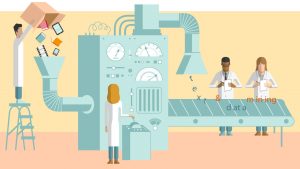Is Data Socialization The Next Big Thing In Data Analytics?
The Big Data revolution in business has come about due to the huge increase in the amount of information we’re able to capture and analyze, from an ever growing number of sources. It’s the driving force behind a wider wave of technology-driven transformation which is taking place thanks to advances in fields such as automation, artificial intelligence and machine learning. Self-driving cars, personalized medicine and the “fourth industrial revolution” are all built on Big Data.
But the growth in the amount of data available is just the start. Data socialization is a term that’s being heard more frequently, and it’s an attempt to tackle the ongoing (and often mission-critical) process of making sure the right data is in front of the right person – a decision maker – at the right time. Get this wrong, and despite all of your good intentions it is likely that your strategy for data-driven transformation will become one of the many Big Data projects that fail.
It makes perfect sense, really. Facebook, Twitter and LinkedIn have spent billions refining systems for individuals to share data with each other – from photographs to philosophies on life.Billions of datapoints have been captured from their worldwide userbases and put under the microscope to learn how, when and why we communicate – share data – with each other. Why not put this technology and knowledge to use to rethink how we share and communicate this data within an organization?
Traditionally in business, work based around data analytics has been the domain of the IT people, often working with “siloed” data which no one else would have easy access to, let alone a hope of understanding. Undoubtedly this is because most of the pioneering work has come out of university computer science and statistics departments, or R&D divisions of large tech companies.

Democratising access to business data
But increasingly, businesses are looking to “democratize” this access to data. It has become apparent that embedding data and analytics throughout an organization, and ensuring its effects can be measured on every process, is often a more productive approach than attempting to impose data-directives in a top-down, centralized manner. From giving shop floor sales staff instant access to personalized (but not necessarily personal – the analytics might be done using anonymized datasets) insights about customers, to allowing engineers to know when an essential machine is likely to fail.
Finally, creating new innovative products and marketing them to the right people, at the right place and at the right time is something which can be done efficiently through data processing. Hence it is imperative that organizations around the world start working on data engineering and data mining.
Source: Forbes, Bernard Marr





 Posted On February 27 2026
Posted On February 27 2026